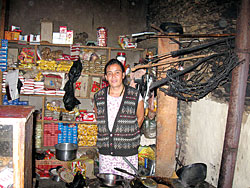 MALLIKA ARYAL |
HELAMBU - A row of two-storied concrete buildings can be seen as the local bus enters Timbu, a town after Melamchi Pul in Sindhupalchok. This is the starting or ending point of the Helambu trail. Tea houses and lodges are sparse here, and those coming down from Sermathang or Gosainkunda stop over in Timbu.
This row of buildings is one of the most popular lodges in Timbu. It has several rooms, separated by corrugated sheets, and it backs directly onto the Melamchi River. Everyone in the village knows the lodge as Roshani Didi's. The kitchen starts buzzing with people from 6am, by which time Roshani Didi (pictured below) will have been up for more than two hours. Little boys and girls stop on their way to school to buy candy, workers stop by for a cup of tea, teenage boys come to buy rice on their way back from school, farmers stop by for a drink of raksi, Melamchi engineers for lunch. It's as busy as you can imagine.
Roshani Didi grew up in Sindhupalchok, but moved to Kathmandu for higher studies. Later, she got involved with a local NGO that works to rescue trafficked women. She was sent to Timbu for work, as Helambu was, and still is, plagued by girl trafficking. It was here that Roshani Didi met her future husband, a local Sherpa. They fell in love and decided to get married, despite their families' objections to the union of a Chettri woman and a Sherpa man.
Roshani Didi left everything behind to build a new life in Timbu, but had to live apart from her husband for many years, with three children to raise, due to misunderstandings with his family. That was when she built the lodge. "I carried sand, bricks, helped the workers, did whatever I could - with him gone I was all alone but I don't give up so easily."
Today Roshani Didi and her husband are back together running the place. They have regular trekking guides bringing in groups, but Roshani Didi's cooking is so popular that bankers and Melamchi managers drive all the way from Kabhre and Kathmandu on weekends to spend the day in Timbu at her place.
Running the hotel is not the only thing Roshani Didi does. She never gave up her work as an activist, even during the difficult years of separation from her husband. She has worked relentlessly to rescue trafficked women, organise awareness programs, and counsel girls from the village. Recently, she went all the way to Sunauli to rescue a couple of village girls who had been stopped at the border. "I didn't have to think twice, I just packed and left to get there before the girls crossed the border," she says
Helambu is just six bumpy hours by bus away from Kathmandu, but it is one of the most impoverished areas in Nepal. "There's so much poverty here that people have no remorse about selling off their own daughters or sisters," she says. The ones who are rescued at the border are the luckiest, as most never make it back from cities such as Mumbai. The handful who do are physically and psychologically damaged and commonly have HIV.
Roshani Didi is a silent soldier in the fight against girl trafficking. Her untiring efforts are a key reason why trafficking in Helambu, though still significant, has gone down so dramatically. And there are so many like Roshani Didi, in every village in Nepal, fighting alone and relentlessly for such big causes. Foot doctors, female community health workers, legal activists and journalists expect nothing in return for the work they do because they care deeply about the issues. In a true sense, those who work at ground level are the ones who are bringing the real change we need in our society, not those who come out on the streets, disrupt normal life to chant slogans, or limit themselves to workshopping. As we leap forward towards a new Nepal, spare a thought for all the Roshani Didis working to make it possible, step by step.
READ ALSO:
Deluge of words - FROM ISSUE #476 (13 NOV 2009 - 19 NOV 2009)
Public domain - FROM ISSUE #474 (30 OCT 2009 - 05 NOV 2009)



